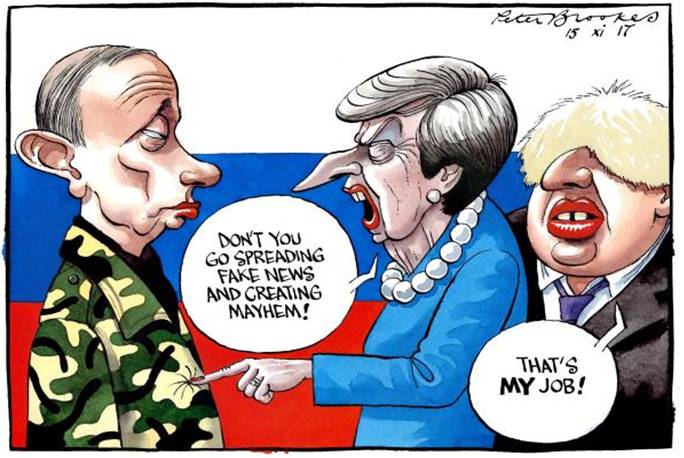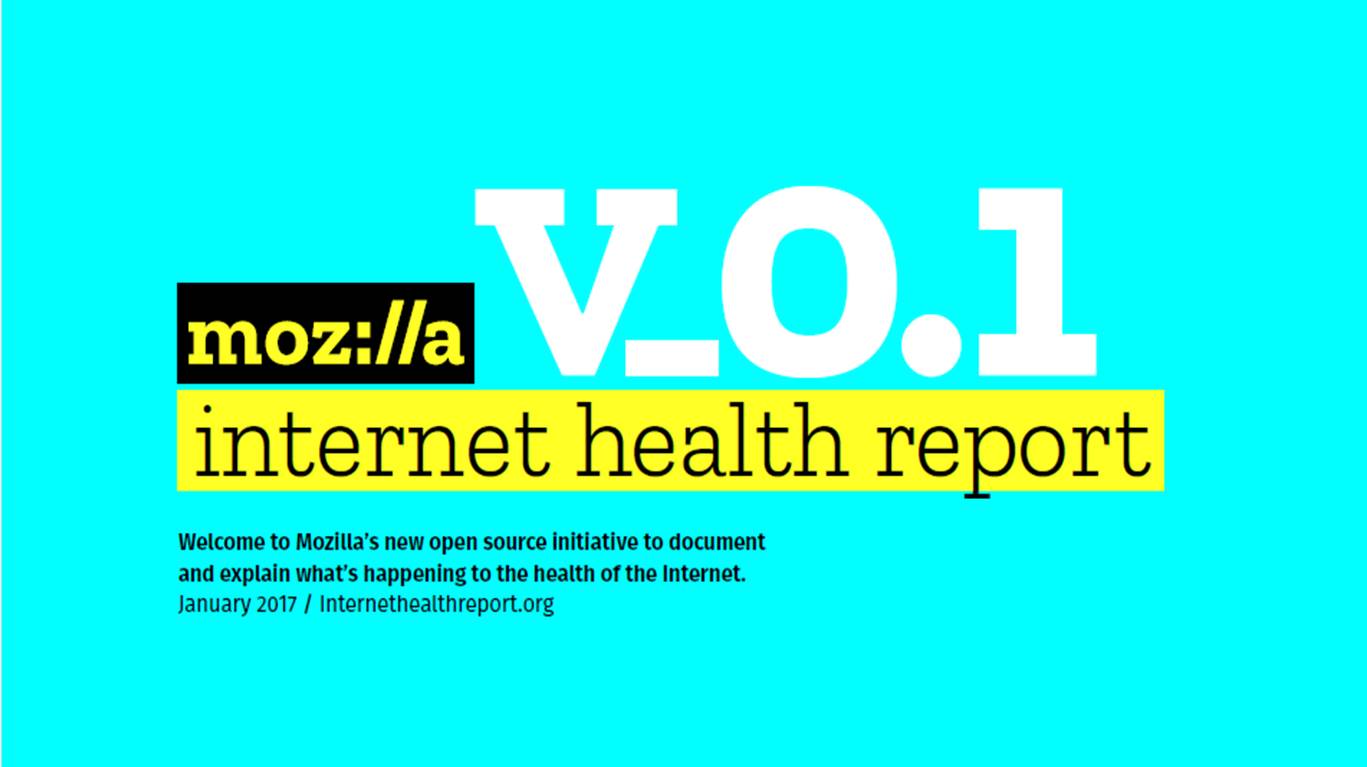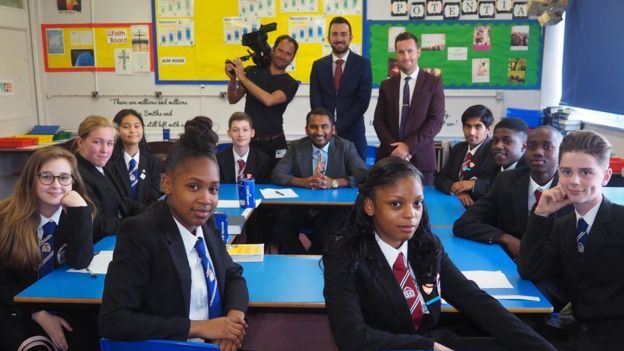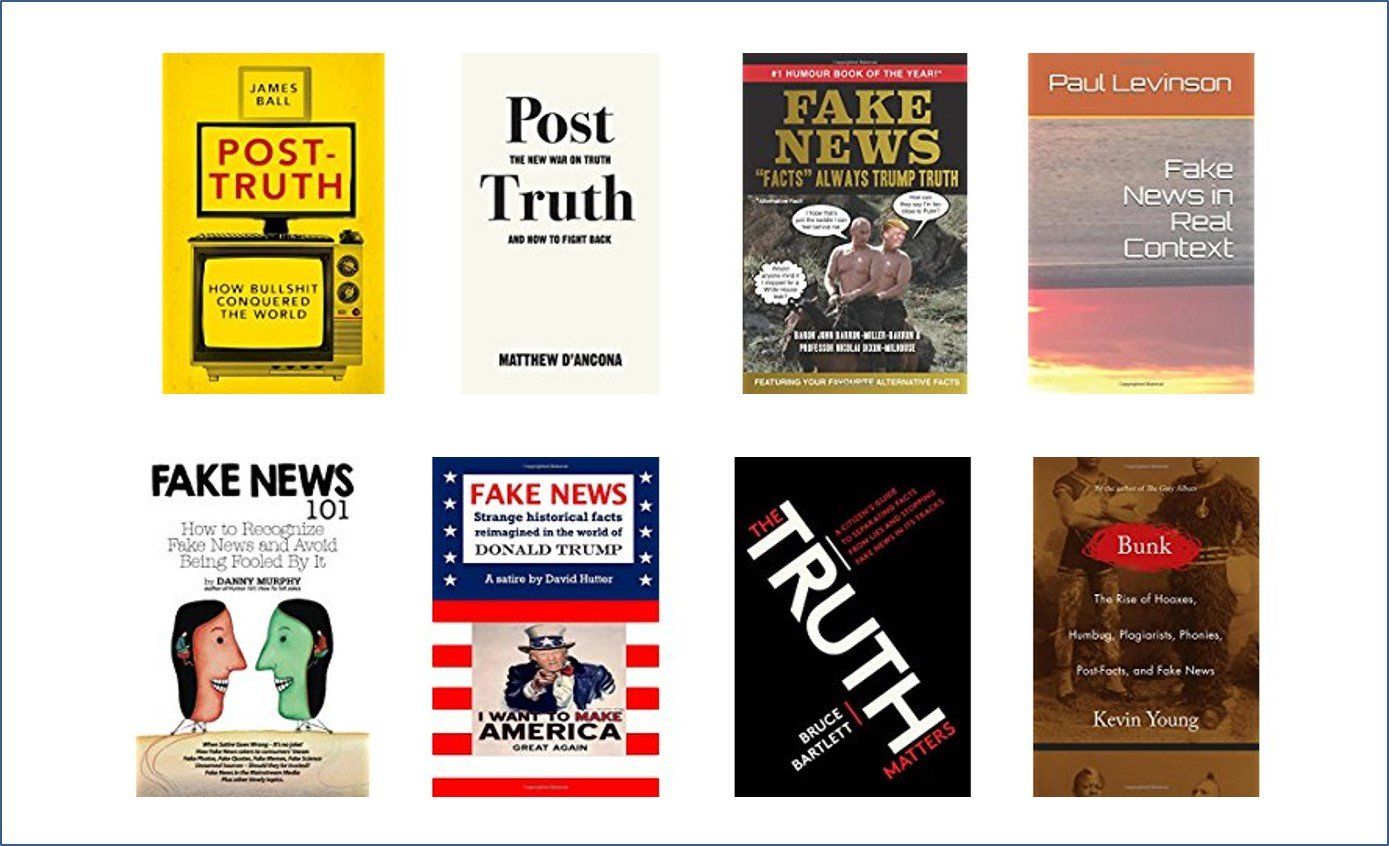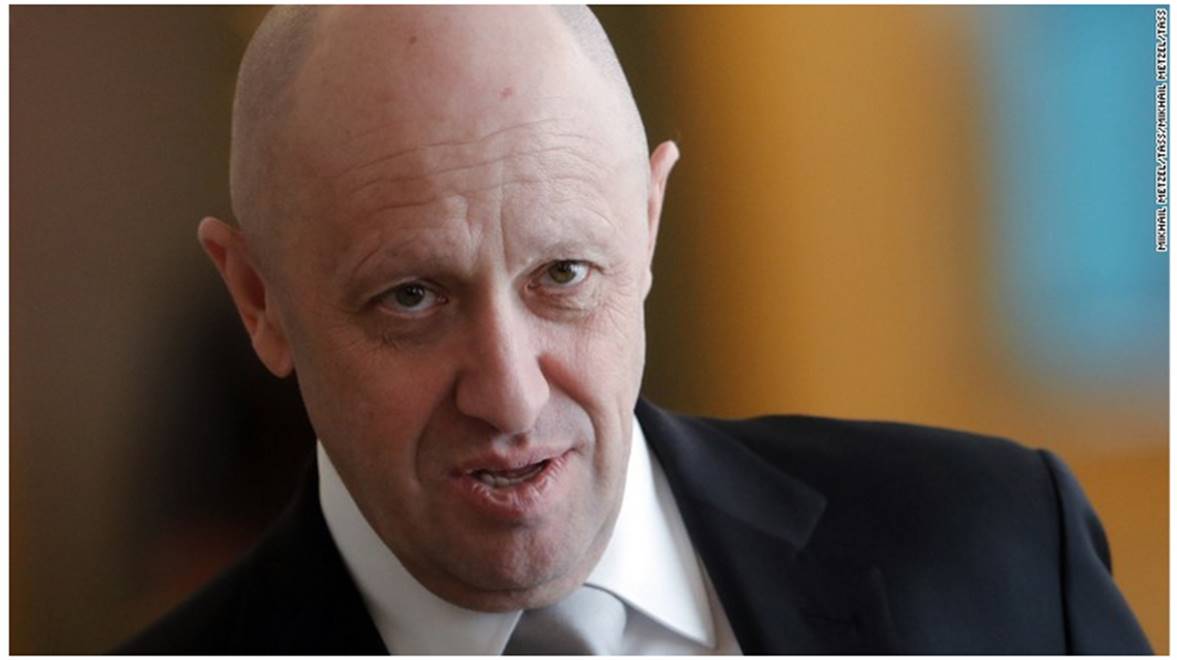2017-05: Fake ‘Fact-Checkers’ Peddling Lies & Misinformation
- by Mike Flood
- •
- 25 Aug, 2017
- •
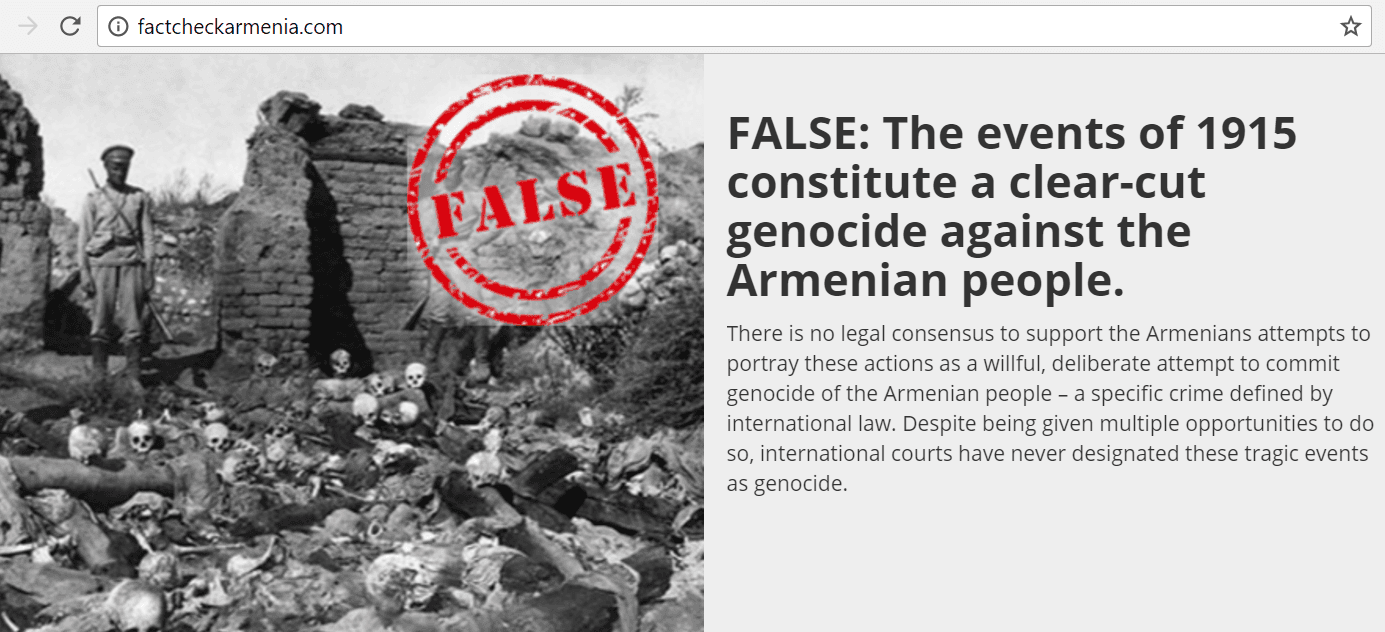
There is growing concern in the fact-checking community about the introduction of state-sponsored fact-checking websites, not least those run by Russia and Turkey. In March RT (formerly Russia Today) set up FakeCheck to "debunk fakes that are extensively distributed across the mainstream media." The development has been met with considerable sarcasm from some in the West.* Indeed it raises all sorts of questions, not least whether FakeCheck (and its Turkish equivalent) will discredit the fact checking movement by focusing on ideologically convenient material or peddling lies and misinformation.
The image is a screen-dump from FactCheckArmenia.com, another website which is being treated with understandable suspicion. (It has hidden its sponsorship but is believed to be sponsored by Turkey). Here’s an extract from a disturbing article on what the website has been up to:
“The Turkish government’s dominance over TV and print media — and its intimidation of critical journalists with arbitrary detentions and trials — is well known. Less known is a sweeping campaign of misinformation orchestrated by bogus fact-checking groups with ties to the government that propagate explosive claims: The Armenian genocide is a lie; the government didn’t try to censor Wikipedia; thousands of government employees who were fired for political reasons have an effective appeals procedure. These fake ‘fact-checkers’ aim to ‘refute’ critical stories about Turkey’s government — even when they contain verified facts.
Last year an aerial stunt spelled out ‘101 YEARS OF GENO-LIE,’ and promoted the website ‘FACT CHECK ARMENIA.COM’ in the skies of Manhattan. The website was also advertised on Google results for search queries on Armenian Genocide.
FactCheckArmenia.com does not reveal who actually owns or runs the website. The whois records, which show ownership of registered websites, are hidden via a company in Bahamas. But their Facebook page say they are funded by the “Turkic Platform.” That platform, with similarly undeclared owners, is “an NGO based in Istanbul” according to the Turkish pro-government media, but many activities seem to take place in the United States.
Just like Fact Check Armenia, ‘FactCheckingTurkey.com,’ launched in 2016, is not a fact-checking service. Instead, it is a project to counter articles critical of Turkey’s government. Unlike nonpartisan fact-checkers, FactCheckingTurkey does not use a transparent methodology to adjudicate claims. Conclusions are usually reached by making reference to government statements.”
* RT has itself been accused of spreading
misinformation (a position it vigorously denies).
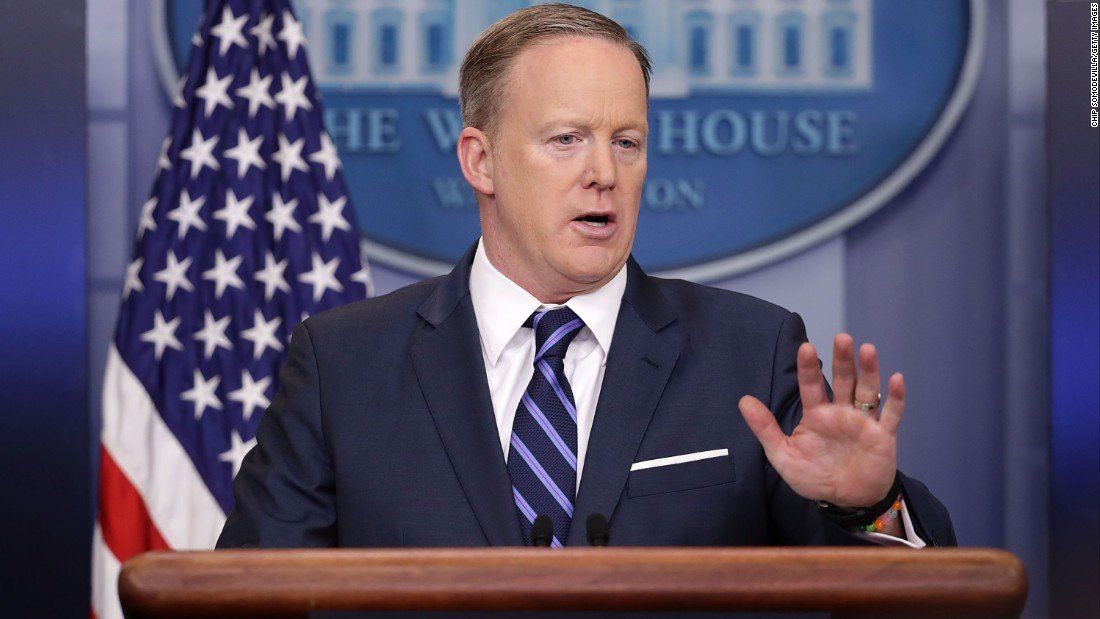
Last night (5 Feb) The Institute of Art and Ideas
debated ‘The
Future of the Post-Truth World’ at the ICA in London. Speakers included Steve
Fuller, Rae Langton and Hilary Lawson, ably managed by Orwell prize-winning
journalist Polly Toynbee. Much ground was covered but one comment caught my
attention: reference to a BBC interview
with Sean Spicer, President Trump’s first Press Secretary. It concerned Spicer’s
now infamous description of the number of people who witnessed Trump’s inauguration.
The media made great play of the fact that the numbers attending were significantly fewer than at Obama’s inauguration. But one of the speakers pointed out that what had been meant by Spicer was the global media coverage not those present. Whether this is true or a convenient explanation of events is not clear. But it does raise the question of how you set the frame, and this was a major focus in the debate between the speakers. It's easy for both sides to believe they are right, and this is a recipe for misunderstanding and polarisation.
There's a Lot Going On!
There has been an enormous increase in the coverage of fake news
and disinformation in the media in recent months. I’ve already identified and logged 24 items in the first 5 weeks of 2018, and this follows 217 items in 2017; 36 in 2016; 11
in 2015; 5 in 2014; and 3 in 2013. I haven't carried out a systematic study of publications on fake news / misinformation worldwide; these are simply items that I personally have
found interesting. There has also been a rapid increase in the number of initiatives
taken by state and other actors to address the problem: I log these in the Critical Information
database and have so far identified over 230 initiatives, no less than 70 in
the UK.
These figures give an indication of size and complexity of the problems that we are facing.
It is to be
welcomed that the topic of misinformation is getting more coverage, and that more people are becoming concerned about the consequences of lies and deception. What we need now is effective methods of neutralising the problem, and this is still a long way off...
Recent Developments
I’ve not been able to comment on developments for a couple of months because of other commitment (now virtually complete), but I have been following events. Here are some of main issues that have been in the media — I’ve identified just one representative article per topic:
Internet
· the repeal in the US of legislation on net neutrality ;
· the issue of controlling unaccountable algorithms ;
Social Media
· Obama warning against 'irresponsible' social media use;
· a prominent former Facebook exec saying social media is ‘ripping apart society’;
· Facebook conceding that using it (a lot) might make you feel bad; also cutting back on news (to give us more time with advertisers);
· calls for tech giants to face taxes over extremist content;
· LinkedIn revealed to have been ‘hosting jihadist lectures’;
Fake News & Conspiracy Theories
· the UK Government announcing the setting up of an anti-fake news unit ;
· the appearance of Deepfake , an app that enables hackers to face-swap Hollywood stars into pornography films;
· climate researchers bemoaning the fact that their work was turned into fake news;
· people believing conspiracy theories about mass shootings in the US being staged;
· how commercial brands secretly buy their way into legitimate publications with material that pretends to be objective;
Hate Speech & Counter-Extremism
· campaigner Sara Khan to lead new UK counter-extremism body;
· new report on hate speech / anti-Muslim messaging on social media [ Hope Not Hate ]
· England (and the US) opting out of the OECD’s Programme for International Student Assessment on the issue of tolerance — PISA is a triennial international survey of some 72 countries which aims to evaluate education systems worldwide by testing the skills and knowledge of 15-year-old students;
Information Warfare
· growing concern in the UK over information warfare — British Army Chief calling for investment to keep up with Russia.
We hope to cover these issues in the next few months.

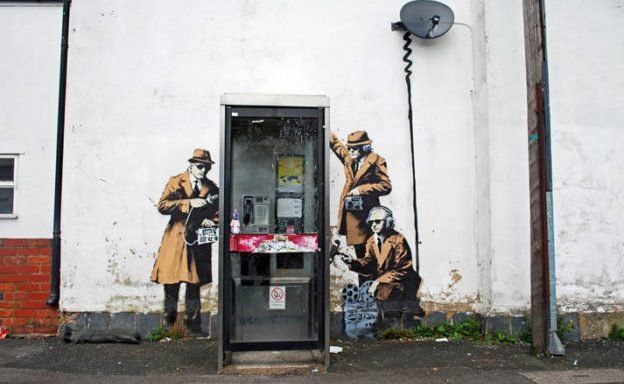
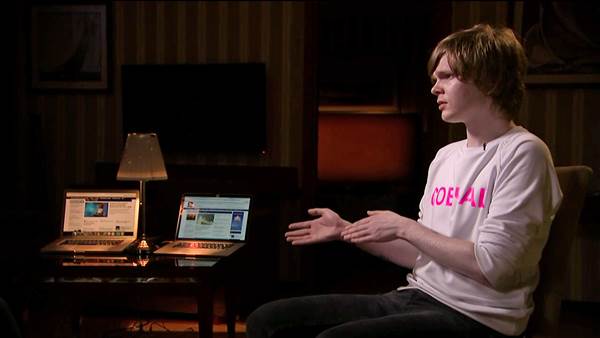
Vitaly Bespalov was once one of hundreds of Russians employed to pump out misinformation online at the Internet Research Agency , Putin’s troll factory in St Petersburg. His story was told this week on the BBC's Profile * and also on NCB News.
The IRA, it appears, is housed in a four-story concrete
building on Savushkina Street in St Petersburg, which is “secured by camouflaged guards and
turnstiles.” There, bloggers and former journalists work “around the clock to
create thousands of incendiary social media posts and news articles to meet
specific quotas.” Those on the third level blog to undermine Ukraine and
promote Russia; those on the first, to create news articles that refer to these
blog. Workers on the third and fourth floor post comments on the stories and
other sites under fake identities, pretending they were from Ukraine. And the
marketing team on the second floor weaves all of this misinformation into
social media.
Even though each floor works on material the other created, according to Vitaly "they don't have any contact with each other inside the building except for in the cafeteria or on smoke breaks…"
The Oxford Internet Institute has been studying "the purposeful distribution of misleading information over social media networks", and in July released a working paper on the topic which argues that computational propaganda (as it is known) is today "one of the most powerful new tools against democracy." The report makes chilling reading. It is based on research across 9 countries (Brazil, Canada, China, Germany, Poland, Taiwan, Russia, Ukraine & the US) carried out “during scores of elections, political crises, and national security incidents.”
Among the study's main findings are that “in authoritarian countries, social media platforms are a primary means of social control”, and in democracies, they are “actively used for computational propaganda either through broad efforts at opinion manipulation or targeted experiments on particular segments of the public." In every country, it says, "we found civil society groups trying, but struggling, to protect themselves and respond to active misinformation campaigns.”
“The most powerful forms of computational propaganda involve both algorithmic distribution and human curation—bots and trolls working together… learning from and mimicking real people so as to manipulate public opinion across a diverse range of platforms and device networks... One person, or a small group of people, can use an army of political bots on Twitter to give the illusion of large-scale consensus... Regimes use political bots, built to look and act like real citizens, in efforts to silence opponents and to push official state messaging. Political campaigns, and their supporters, deploy political bots—and computational propaganda more broadly—during elections in attempts to sway the vote or defame critics. Anonymous political actors harness key elements of computational propaganda such as false news reports, coordinated disinformation campaigns, and troll mobs to attack human rights defenders, civil society groups, and journalists.”
The paper concludes that social media firms “may not be creating this nasty content, but they are the platform for it. They need to significantly redesign themselves if democracy is going to survive.” In this respect it is good to see Google announcing (21 Nov) that it is going to ‘derank’ stories from Kremlin-owned publications RT ( Russia Today ) and Sputnik in response to allegations about Russia meddling in western democracies. Not surprising the Kremlin says it is incensed by the move, and denies any knowledge of the activities of the St Petersburg troll factory. It has suggested that reports that it exists might be fake.
Apparently Vitaly Bespalov no longer believes anything he reads on social media. It would be helpful if more people could adopt this attitude -- and the social media platforms do more to remove the poison from people's phones and desk tops.
One can't help wondering where Vitaly is today, we assume he’s in hiding — that is, if he’s a real person and not the product of a fertile western imagination/dirty trick.
* The actually BBC profiled the man accused of funding the St Petersburg troll factory, Yevgeny
Prigozhin, who, as it says "has moved from jail to restaurateur and
close friend of President Putin, but precious little is known about his
personal life."
